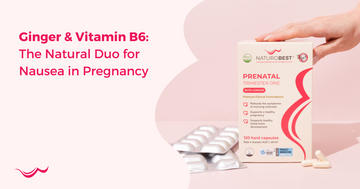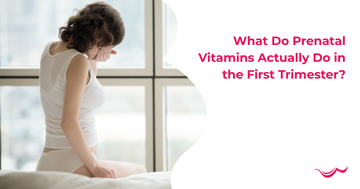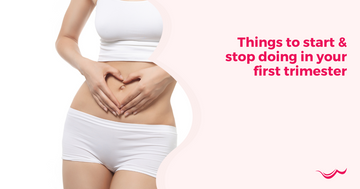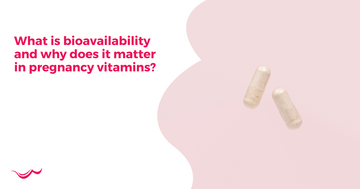Types of Folate During Pregnancy
by NaturoBest Naturopath Team on Jul 16, 2024

Pregnancy is a journey filled with joy, anticipation, and sometimes a bit of uncertainty. One of the significant concerns for many expectant mothers is ensuring they are doing everything possible to support their baby's development and their own well-being. Nutrition plays a critical role in this, and folate is a key player in a healthy pregnancy.
Is Folate or Folic Acid Better for Pregnancy?
A common question that arises is whether to opt for folate or folic acid during pregnancy. These terms are often used interchangeably, but they have distinct differences.
Folate is the natural form of vitamin B9 found in foods like leafy greens, citrus fruits, and legumes. Folic acid, however, is the synthetic form commonly found in supplements and fortified foods. While both are vital for a healthy pregnancy, folate is generally better absorbed and utilised by the body.
Research indicates that natural folate is more bioavailable, meaning your body can use it more efficiently. Folic acid requires conversion into its active form, and this process can be less efficient for some individuals. To ensure optimal absorption, look for prenatal vitamins that contain methylated folate or 5-MTHF. This form is readily usable by the body and helps you get the most out of your supplement.
How Much Folate for Pregnancy?
Knowing the right amount of folate to take is crucial for supporting a healthy pregnancy. Current guidelines recommend that pregnant women aim for at least 600 micrograms of folate daily. This amount supports your baby's development and helps maintain your health.
It's also beneficial to start increasing your folate intake before conception. Women of childbearing age are advised to get 400-800 mcg of folate daily. This preparatory step ensures that folate levels are adequate from the very start of pregnancy, which is critical during the early developmental stages.
A good pre-pregnancy supplement should contain at least 500mcg of folate. This can be made up of active folate like Quatrefolic or folinic acid which is one step removed from active (methylated) folate. Folinic acid is more suitable for long term use as taking methylated folate long term may lead to overmethylation.
To meet these requirements, include folate-rich foods in your diet:
- Leafy greens like spinach and kale
- Citrus fruits such as oranges and lemons
- Beans and legumes like lentils and chickpeas
- Whole grains and fortified cereals
While a balanced diet is essential, it can be challenging to get enough folate from food alone, especially during pregnancy. This is where a good prenatal supplement with methylated folate can be beneficial.
What is Folate?
Folate is a water-soluble B-vitamin (B9) essential for numerous bodily functions, particularly during periods of rapid growth like pregnancy. It's involved in DNA synthesis, repair, and functioning, which are critical for the developing baby.
Folate is crucial during pregnancy as it supports the formation of the neural tube, which later develops into the baby's brain and spinal cord. Adequate folate intake can significantly reduce the risk of serious birth conditions. Additionally, folate aids in the growth and functioning of the placenta, ensuring your baby receives the necessary nutrients for healthy development.
For expectant mothers, folate also helps produce red blood cells, which are vital for transporting oxygen throughout your body and to your baby. This supports your energy levels and overall health during pregnancy.
Folate During Pregnancy
One of the main concerns during pregnancy is the fear of not providing adequate nutrition for the baby. This anxiety can be overwhelming, but understanding the role of folate can help ease these fears. Ensuring sufficient folate intake is a proactive step you can take to support your baby's development and your own health.
Another common issue is the frustration of navigating conflicting dietary and supplement advice. With so much information available, it can be difficult to know how to choose the best prenatal vitamin. By focusing on natural folate sources and choosing supplements with active folate, you simplify your choices and make confident decisions for your health.
The ultimate goal for any expectant mother is a healthy pregnancy and baby. By prioritising folate intake, you’re taking a crucial step towards this goal. This not only supports your baby’s development but also contributes to your own well-being, making pregnancy a more enjoyable experience.
Additionally, peace of mind is invaluable. Knowing you’re doing everything possible to support your baby’s health can alleviate stress and help you feel more empowered and confident in your pregnancy journey.
Practical Tips for Increasing Folate Intake
1. Eat a Folate-Rich Diet: Incorporate leafy greens, citrus fruits, beans, and whole grains into your meals. A smoothie with spinach and orange juice is a great start to the day.
2. Choose the Right Supplement: Opt for prenatal vitamins that contain active (methylated) folate (5-MTHF). This form is easier for your body to absorb and use.
3. Plan Your Meals: Ensure your meal plan includes at least one folate-rich food in each meal to consistently meet your needs.
4. Cook Smart: To preserve folate, steam vegetables instead of boiling them.
5. Stay Informed: Regularly discuss your folate intake with your healthcare provider to get personalised advice and ensure you're on track.
Folate is a cornerstone of a healthy pregnancy, playing a critical role in your baby's development and your overall health. By understanding the difference between folate and folic acid, knowing how much you need, and incorporating practical tips to increase your intake, you can take confident steps towards a smooth and successful pregnancy.
Remember, a balanced diet and the right supplement can make all the difference. Prioritising folate ensures you’re giving your baby the best start in life and paving the way for a healthier, happier you.
PS: If you're looking for a high-quality prenatal vitamin, be sure to choose one with active folate such as Quatrefolic® to maximise absorption and benefits.




